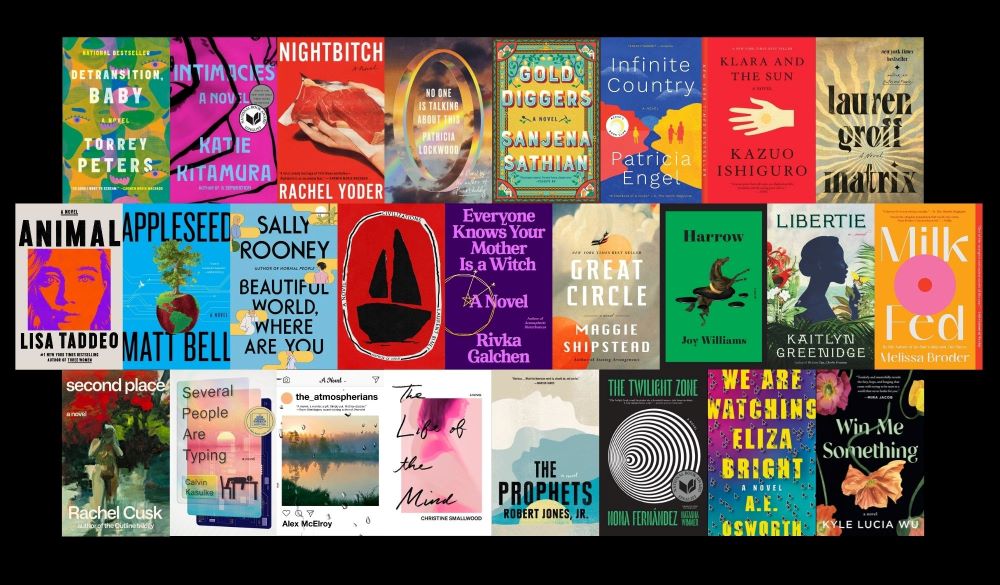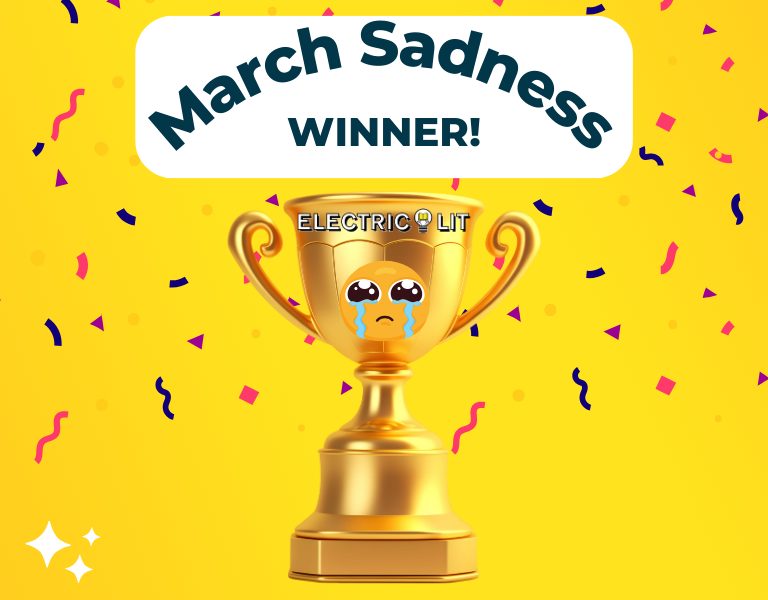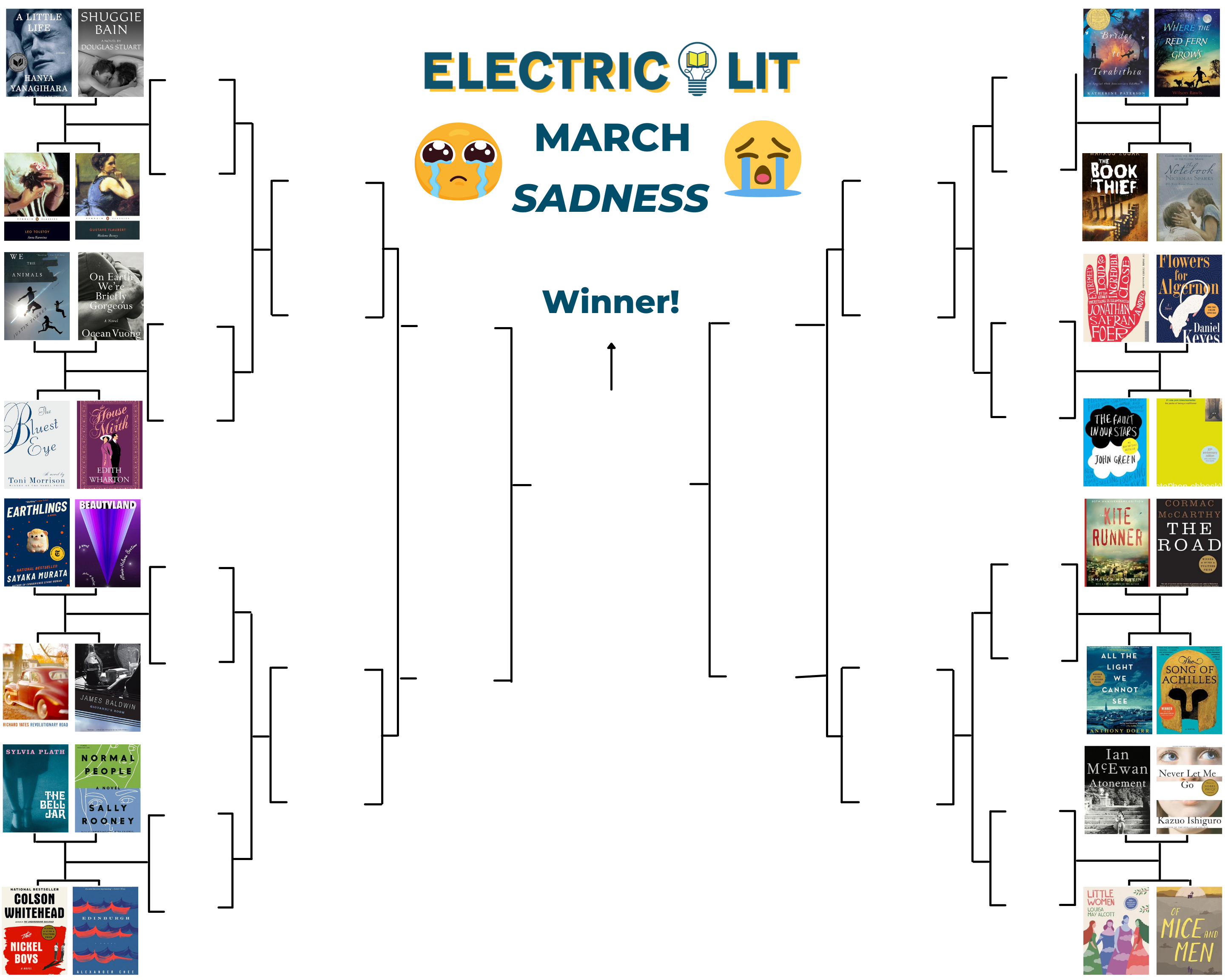Reading Lists
Electric Lit’s Favorite Novels of 2021
Katie Kitamura, Torrey Peters, and Rachel Yoder are among the best 25 novels of the year

When it comes to great novels, this year felt like an embarrassment of riches. The books collected here are ambitious—in intellect, in scope, in subject matter, and in size. Some are perfect encapsulations of the unique problems of our time, while others illuminate the human threads that connect us through time and space. Novelists often task themselves with these kinds of far reaching goals, and when they are achieved, it’s a bit like catching a shooting star mid-flight: a few parts chance, many more parts hard work and dedication in the form of returning to the page day after day. Each of these writers is a master in their craft. Each of these books deserves a place on your shelves and in your hearts. Electric Literature staff and contributors voted for their favorite novels of the past year. Here are the top three, followed by additional favorites (there were many ties!) in alphabetical order.
The Top 3 Novels of the Year:
Intimacies by Katie Kitamura
In Intimacies, the unnamed protagonist is an interpreter who accepts a job at The Court, an organization tasked with trying men accused of perpetrating large-scale human atrocities. As her work becomes increasingly controversial, the interpreter finds herself pulled between multiple truths, unable to pinpoint her own role in stories defined by moral ambiguity. Katie Kitamura’s fourth novel, which was longlisted for the National Book Award, considers what happens when a woman’s professional commitments require erasure of her personal life. For an interesting discussion of the questions upon which she built her latest novel, check out Electric Lit’s interview with Kitamura.
Detransition, Baby by Torrey Peters
Detransition, Baby can be accurately described as “funny and gossipy” and “insightful and cutting” in the same breath (indeed, Refinery29’s review of the book did exactly that). The success of Torrey Peters’ debut novel is certainly attributable in some part to its inherent contradictions—it’s a “domestic novel” that eschews heteronormative ideas about domesticity. Detransition, Baby is also an incredible story about two trans women that, as our interviewer noted in a conversation with Peters on Electric Lit earlier this year, “feels simultaneously familiar and utterly new at the same time.”
Nightbitch by Rachel Yoder
In an essay on fiction’s recent interest in leveraging horror to make sense of motherhood, Rachel Manns McKenny describes Nightbitch as “a satirical swipe at the failed ‘have it all’ lifestyle that so many Gen X and millennial mothers assumed was possible.” Indeed, Yoder’s protagonist is such a woman, though by the end of the novel she’s less a generational prototype for anytime and more just a burned-out pissed-off mom who turns into a dog. If you’ve ever suspected motherhood had a darker, possibly feral underbelly, you’re sure to enjoy this darkly hilarious debut—and if you still want more, read Electric Lit’s interview with Rachel Yoder and this gorgeous essay on finding your inner wolf.
Electric Lit’s Other Favorite Novels:
Appleseed by Matt Bell
Matt Bell’s third novel is nothing if not ambitious. Spanning more than one thousand years in time and featuring an eclectic cast of characters, Appleseed is the latest in the quickly expanding genre of climate fiction. The novel is set in three time periods—the 1700s, the near future, and a far-future ice age—and ultimately asks the big question: Is our world worth saving?
Civilizations by Laurent Binet, translated by Sam Taylor
In his third novel in translation, Laurent Binet returns to the form he’s best known for: imaginative historical fiction. Beginning in the Viking Age, Civilizations follows Freydis, a woman warrior leading a band of Vikings that mysteriously disappears without a trace. Fast forward to the late fifteenth century, the story picks up in the journals of Christopher Columbus, as he is exploring a new world and ultimately taken captive by the Incas. The story concludes from the perspective of Atahualpa, the last Incan emperor who arrives in Europe on ships stolen from Columbus.
Milk Fed by Melissa Broder
Broder’s sophomore novel is, arguably, even stronger (but by no means less beguiling) than, The Pisces, her debut. Milk Fed features a memorable protagonist: 24-year-old Rachel is a lapsed Jew struggling with an eating disorder who is, when the story opens, beginning a 30-day detox treatment for her unhealthy codependent relationship with her mother. As she navigates the various toxicities attendant to living a life in Hollywood-adjacent Los Angeles, Rachel unexpectedly falls into a complicated (and hilarious) relationship with Miriam, a young Orthodox Jewish woman who works at her favorite frozen yogurt shop. This is a story that truly could not be told by anyone other than Broder—and Electric Lit staffers loved it enough to recommended it in both our 9 Diverse Novels Starring Bisexual+ Main Characters and 10 Books About Alienated Women in Their 20s lists.
Second Place by Rachel Cusk
Following the conclusion of her Outline trilogy, Rachel Cusk’s latest was one of the buzziest books of 2021. In it, a female writer invites a male artist—a painter for whom she harbors a peculiar obsession—to spend the summer in her guesthouse on a remote coast. As time passes, the narrator slowly realizes that her invitation may have unexpected and destabilizing consequences.
Infinite Country by Patricia Engel
Told in the five voices of a Colombian family, Patricia Engel’s third novel spans continents, generations and the consequences of a family in pursuit of safety and opportunity. The first chapter opens with Talia, a 15-year-old girl who escapes from a correctional facility in Bogotá and tries to reunite with her family in the United States. As the story unfolds, often at a breakneck pace, readers are given the family history in a kaleidoscopic tale that is as fractured as the family it centers.
The Twilight Zone by Nona Fernández, translated by Natasha Wimmer
Fernández’s second novel opens during Pinochet’s terrifying reign in 1980s Chile when a man walks into a magazine office and starts talking. Andrés Antonio Valenzuela Morales is a secret service agent and, as he reels off his ghastly list of state-sponsored murders, his confessions set the stage for what ultimately becomes the narrator’s story and her lifelong obsession with “the man who tortured people.”
Everyone Knows Your Mother Is a Witch by Rivka Galchen
In an interview with Electric Lit, Rivka Galchen commented that there’s “something comforting about traveling back in time” to places where horrifying events have ended (unlike current horrifying events, which are ongoing). The events of Galchen’s second novel, set in the 1600s, are certainly horrifying—the narrator is accused of being a witch and faces all the consequences such an accusation entails (i.e., financial ruin, torture, execution)—and yet Galchen manages to infuse the story with a healthy dose of both intrigue and humor.
Libertie by Kaitlyn Greenidge
In Kaitlyn Greenidge’s Libertie, a mother and daughter search for a deeper freedom during the Reconstruction era. The novel follows Dr. Cathy Sampson and her daughter Libertie from free Black spaces in Brooklyn to free Black spaces in Haiti; as much as the novel is about freedom from societal chains, it is also about freedom from the weight of familial expectations. Check out Electric Lit’s interview with Greenidge in which she discusses reimagining what real freedom looks like.
Matrix by Lauren Groff
In a departure from previous work set in modern times, Lauren Groff’s fourth novel takes place during the twelfth century. When the novel’s protagonist, Marie de France, is banished from the royal court by Eleanor of Aquitaine at seventeen, she ends up the prioress of an impoverished abbey populated by starving nuns. Matrix, a National Book Award Finalist, is a surprising and timely portrait of female power in a world that discourages feminine strength.
Klara and the Sun by Kazuo Ishiguro
Klara, the protagonist of Kazuo Ishiguro’s latest novel, is an Artificial Friend (AF), designed to be the perfect companion for the human customer lucky enough to purchase her. That customer, Josie, is unwell, a consequence of the gene editing therapy that, ironically, was meant to “lift” her above her biological constraints. As Klara accompanies Josie through a turbulent childhood she does not fully understand, Klara and the Sun offers insight about the premium placed on able-bodied productivity, as well as sharp commentary on the fantasy of the servant who loves you back.
The Prophets by Robert Jones, Jr.
Robert Jones, Jr.’s debut novel is about a forbidden romantic relationship between two Black men enslaved on a Mississippi plantation during the Antebellum. In exploring queerness through a new lens rarely applied in literature, Jones’ The Prophets delivers a powerful historical novel about Black queer identity.
Several People Are Typing by Calvin Kasulke
Calvin Kasulke is a master of the literary stunt (just check out his Literary Stunt Index and list of books that trade on bold conceits). In his debut, a novel that could not be more perfect for a year defined by work from home culture, Kasulke sticks the landing of a trick all his own. Several People Are Typing takes place entirely on Slack (the office messaging system now favored by nearly every remote work-equipped company), and follows Gerald, a hapless worker who gets, literally, trapped inside Slack. For witty banter, fun discussion, and Kasulke’s thoughts on vast and unknowable things, check out this interview.
No One Is Talking About This by Patricia Lockwood
Patricia Lockwood, one of the hailed “Poet Laureates of Twitter,” Logs On for this experimental and unusual novel. When a woman goes viral for a tweet—“can a dogs be twins”—she begins existing in “the portal,” musing about trivialities and memes. Midway through the narrative (formatted as a series of short paragraphs), the woman is jolted out of the portal, back to reality. Suddenly, the world of the portal and her internet virality don’t matter in the face of personal and familial tragedy.
The Atmospherians by Alex McElroy
Sarah Marcus, a once-beloved influencer, gets canceled and left without a career. When she reaches out to her childhood friend, he suggests that she should become the face of his new business venture: The Atmosphere, a cult-like rehab center meant to cure men of toxic masculinity. The two cult leaders now must venture into the desert with a group of misogynists to see if they have the chops to make the world a better place, when they secretly only want attention and praise. The Atmospherians is a funny dystopian fantasy sure to please readers drowning in the depthless waters of social media.
We Are Watching Eliza Bright by A. E. Osworth
Eliza Bright, a coder at a gaming company and the only woman to have reached elite status, files a sexual harassment report and is subsequently fired. After airing her frustrations to a reporter, she’s doxxed, and becomes a rallying figure for women everywhere. The escalation that follows is a gripping, masterfully told novel that complicates obsession and violence alongside male and female rage. Check out this interview for A. E. Osworth’s thoughts on writing from dueling perspectives in We Are Watching Eliza Bright.
Beautiful World, Where Are You by Sally Rooney
Alice, Felix, Eileen, and Simon are young, but each of them is ready for something more. They desire each other, coming together, breaking apart and obsessing over every step they take. Rooney’s work is as thought-provoking and controversial as any writer of her status: Bekah Waalkes describes her as the “patron saint of the situationship,” while Malavika Kannon reflects on the dissonance of reading and loving Rooney’s work, even as a queer, brown woman of color. No matter how you slice it, Beautiful World, Where Are You is a defining contemporary novel that both reflects the zeitgeist and inspires imitation.
Gold Diggers by Sanjena Sathian
Voiced by Neil—Neeraj when his parents are angry at him—Gold Diggers is set in the Indian American suburbs of Atlanta. Neil, less interested in the outsized ambitions his community and family have thrust upon him, is consumed with his neighbor and childhood friend Anita. When he learns that she and her mother Anjali are using alchemy to brew stolen gold and ensure Anita’s success, Neil wants in: consequences be damned! Read this interview with author Sanjena Sathian to learn more about her unique brand of literary magic.
Great Circle by Maggie Shipstead
Marian Graves, rescued from a sinking ocean liner as an infant in 1914, grows up to be a pilot whose greatest ambition is to circumnavigate the globe by flying over the north and south poles. A century later, Hadley Baxter is chosen to play Marian in the film adaptation of her mysterious disappearance. In Great Circle, both women’s interwoven tales unfold over the course of this epic, emotional novel about self-determination and the cult of celebrity.
The Life of the Mind by Christine Smallwood
In Christine Smallwood’s bracingly intelligent debut novel, The Life of the Mind, Dorothy’s recent miscarriage—a tightly kept secret that only her boyfriend knows—haunts her until the very last page. It’s the kind of secret that eats away at her as she tries to make sense of a world she can’t control and a loss that feels like a failure. Read more about how Christine Smallwood approached writing secrecy and grief in this interview.
Animal by Lisa Taddeo
Lisa Taddeo’s follow up to her New York Times bestselling character study Three Women, Animal is a raw and honest portrayal of Joan, a woman who reaches her breaking point after a lifetime of coping with the cruelty of men. Soaring from New York City to the hills of Los Angeles in the wake of witnessing a violent act, Joan flees in search of Alice, the only woman alive who can help her reckon with her past. Read this interview to learn more about Lisa Taddeo’s approach to writing female rage and depravity.
Harrow by Joy Williams
The first novel in over twenty years from Joy Williams, Harrow is a marvel to behold and tells the story of the end of the world. Known primarily for her short stories, this post-apocalyptic narrative hinges on environmental ruin. The main character, Khirsten’s, eerie statement that “It is too late to be afraid,” echoes throughout, bringing urgency to the question of cause and effect, and as the doers of harm, do we deserve salvation?
Win Me Something by Kyle Lucia Wu
Willa Chen never felt like she fit in—not in her family where her parents divorce early, and not in her mostly white school. After drifting through high school and college, she begins working as a nanny for a wealthy white couple—The Adriens—and their daughter, Bijou. Win Me Something, Kyle Lucia Wu’s debut novel, is the stunning coming of age tale of a young woman searching for belonging and finding power in defining herself.








